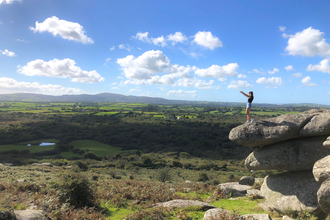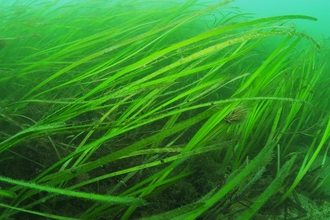St Austell Bay is home to some of Cornwall’s most spectacular marine habitats. Its seagrass and maerl beds, among the largest in the UK, store carbon and support wildlife, including cuttlefish and the rare short-snouted seahorse. The bay’s marine environment is also important to the area’s economy, attracting visitors and supporting the local fishing industry. Yet, despite their significance, St Austell Bay’s seagrass and maerl beds currently have no statutory protection to prevent, or limit, damaging practices.
Cornwall Wildlife Trust is concerned that these habitats could be negatively impacted by South West Water’s proposals to construct and operate a water desalination plant in the area. Whilst we recognise the challenge South West Water faces in providing drinking water for an increasing population within a changing climate, we are calling on South West Water to ensure proposed developments do not negatively impact nature.
We have five specific asks:
- Demonstrate the need for a desalination plant
The high energy use of desalination as a method of drinking water provision, alongside other impacts of the plant and its operation, must be weighed-up against the corresponding demand. It is important for South West Water to justify the proposed desalination plant over alternatives, and to demonstrate this is the best option environmentally.
- Engage closely with local communities and other key stakeholders
Communities have valuable local knowledge as well as legitimate questions about the proposed plans. We know there are widespread questions about the need for a desalination plant and, that there are concerns about potential impacts on maerl and seagrass. It is important for South West Water to deliver meaningful, open and constructive consultation both in-person and online.
- Ensure the highest standards of environmental data collection and monitoring to inform plans
The specific impacts (negative or otherwise) of constructing and operating a desalination plant in St Austell Bay are currently unknown. Cornwall Wildlife Trust is calling on South West Water to ensure that no work is planned without first understanding potential risks to nature, with these being continuously monitored - throughout construction and operation. This understanding must be rooted in sound data and evidence.
- Avoid damage to important habitats during any potential construction (most notably the bay’s seagrass and maerl beds)
Once robust, clear evidence is secured, it should be used to inform the design and construction of any proposed infrastructure. First, by avoiding all severe risks (for example, to irreplaceable habitats such as maerl), before minimising further threats, restoring habitats where damage has been done, and then – as a last resort – offsetting any residual impacts.
- Demonstrate that the operation of the proposed plant will not significantly impact the area’s marine ecosystem
A key concern is that a potential future development phase of the plant could see hypersaline water (concentrated brine or very salty water) pumped into the bay once fresh water has been extracted. Cornwall Wildlife Trust is concerned that this could damage the bay’s ecosystem, threatening the seagrass and maerl beds. South West Water must secure credible data and evidence to demonstrate that the future operation of any plant would pose no threat to St Austell Bay’s seagrass and maerl beds.






